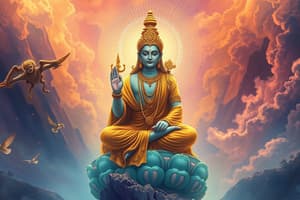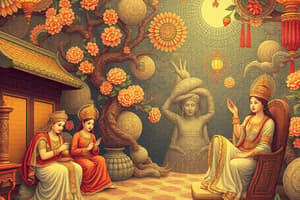Podcast
Questions and Answers
What is the term for the endless cycle of rebirths in Hinduism?
What is the term for the endless cycle of rebirths in Hinduism?
- Karma
- Dharma
- Moksha
- Samsara (correct)
What is the primary duty defined as religious or moral in Hinduism?
What is the primary duty defined as religious or moral in Hinduism?
- Samsara
- Karma
- Dharma (correct)
- Moksha
Which figure is considered the founder of Judaism?
Which figure is considered the founder of Judaism?
- Moses
- Jacob
- Abraham (correct)
- Isaac
Which of the following is NOT one of the five pillars of Islam?
Which of the following is NOT one of the five pillars of Islam?
Which holiday in Christianity marks the resurrection of Jesus Christ?
Which holiday in Christianity marks the resurrection of Jesus Christ?
What is the Jewish regulation that prohibits certain foods and dictates their preparation?
What is the Jewish regulation that prohibits certain foods and dictates their preparation?
Which aspect of Hinduism involves achieving a divine understanding to attain liberation?
Which aspect of Hinduism involves achieving a divine understanding to attain liberation?
Which of the following is associated with the concept of the Trinity in Christianity?
Which of the following is associated with the concept of the Trinity in Christianity?
Flashcards
Monotheism
Monotheism
The belief in one god.
Samsara
Samsara
The endless cycle of birth, death, and rebirth in Hinduism.
Dharma
Dharma
The concept of moral duty and righteous conduct in Hinduism.
Karma
Karma
Signup and view all the flashcards
Moksha
Moksha
Signup and view all the flashcards
Synagogue
Synagogue
Signup and view all the flashcards
Shahadah
Shahadah
Signup and view all the flashcards
Five Pillars of Islam
Five Pillars of Islam
Signup and view all the flashcards
Study Notes
Monotheistic and Polytheistic Religions
- Monotheistic: Belief in one God.
- Polytheistic: Belief in multiple Gods.
Hinduism
- Samsara: The continuous cycle of birth, death, and rebirth.
- Dharma: Religious and moral duty.
- Karma: The sum of a person's actions, which determines their future rebirths.
- Moksha: Liberation from the cycle of rebirth.
- Reincarnation: The atman (soul) taking on a new body after death.
- Brahma: The creator god.
- Vishnu: The preserver god.
- Shiva: The destroyer god.
- Path to salvation: Meditation, fulfilling dharma, detaching from material desires, and understanding the divine.
- Gandhi: Important Hindu figure who promoted non-violent resistance.
Judaism
- Founder: Abraham.
- Key figure: Moses.
- Orthodox Jews: Strict adherence to Jewish traditions; written and oral Torah are considered evolving communication from God. Men are typically leaders of the spiritual community.
- Kashrut: Jewish dietary laws, prohibiting certain foods and specific preparation methods.
- Prophet: A person who speaks on behalf of God.
- Number of commandments: 613.
- Synagogue: Jewish house of worship.
- Hanukkah: An eight-day festival celebrating the rededication of the Second Temple in Jerusalem. Often in December.
Christianity
- Founder: Jesus Christ.
- Creed: Commonly the Apostles' Creed, such as believing in God, the Father Almighty, creator of heaven and earth.
- Most important holiday: Easter (resurrection of Jesus).
- Pentecost: 50 days after Jesus' ascension into heaven.
- Symbol: Fish (representing Jesus).
- Trinity: The concept of God as Father, Son (Jesus), and Holy Spirit.
Islam
- Ancestor: Abraham.
- Important site: Ka'ba (black cube) in Mecca, a place of worship.
- Founder: Muhammad.
- Definition: Submission to God's will.
- Believer called: Muslims.
- Profession of faith: Shahadah.
- Five pillars: Shahadah, Prayer (salat), Alms (zakat), Fasting (sawm), Pilgrimage (hajj).
Studying That Suits You
Use AI to generate personalized quizzes and flashcards to suit your learning preferences.




